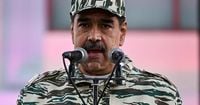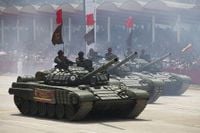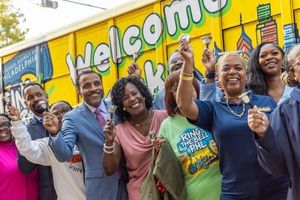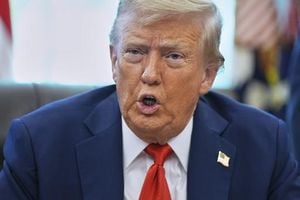On Monday, August 25, 2025, Venezuela’s government announced a sweeping military deployment along its border with Colombia, sending 15,000 troops and police into the volatile region. The move, which officials say is aimed at combating drug trafficking and criminal groups, has sent ripples through South America and drawn international attention, especially as U.S. naval forces ramp up their own anti-narcotics operations in the nearby Caribbean.
Venezuelan Interior and Justice Minister Diosdado Cabello revealed the plan in a televised statement, declaring that the operation—dubbed Relámpago del Catatumbo—would focus on the border states of Zulia and Tachira. These areas have long been hotspots for smuggling, illegal armed groups, and cross-border crime. Cabello detailed that the deployment would include not just troops, but aviation assets, riverine units, and drones, promising to “evict those who seek to install themselves on the border to commit crimes.” According to Noticias Venevision, Cabello emphasized, “Here, we do fight drug trafficking; here, we do fight drug cartels on all fronts.”
The timing of the announcement was anything but coincidental. Just as Venezuela was beefing up its border, U.S. destroyers and amphibious ships—including the USS San Antonio, USS Iwo Jima, and USS Fort Lauderdale—were reported by Reuters to be steaming into the southern Caribbean. The Pentagon described the deployment as an anti-narcotics operation, but regional analysts and Venezuelan officials saw it as a clear show of force. The U.S. has doubled its reward for information leading to President Nicolás Maduro’s capture to $50 million and increased the reward for Cabello’s arrest to $25 million, accusing both men of working with the so-called “Cartel de los Soles” (Cartel of the Suns), a powerful drug trafficking organization allegedly embedded within Venezuela’s military ranks.
Caracas, for its part, has repeatedly rejected these allegations. Cabello was adamant in his televised remarks, stating, “The false ‘Cartel of the Suns’ is used as a political excuse.” He insisted, “Venezuela is a territory free of drug trafficking.” The government has highlighted its own anti-narcotics efforts, reporting the seizure of 52 to 53 tons of drugs so far in 2025, along with the confiscation of more than 480 firearms, the destruction of 400 aircraft, 92 clandestine runways, 28 logistical structures, five semi-submersibles, and 80 high-powered engines used in trafficking, as reported by various outlets including El Tiempo and Noticias Venevision.
The reaction across the border in Colombia has been mixed. Some authorities in towns like Cúcuta, near the Simon Bolivar bridge, expressed guarded optimism that the deployment could help restore order and possibly even improve relations with Caracas. Others, however, worried about the risks of increased militarization in a region already fraught with tension. According to El Tiempo, Colombian authorities have yet to respond formally to Cabello’s call for Bogotá to step up its own border security measures.
Diplomatic relations between Venezuela and Colombia have been rocky for years, but under Colombian President Gustavo Petro, there have been attempts to thaw the ice. Yet, the latest developments have exposed deep fault lines. Cabello claimed the deployment had the “knowledge and cooperation” of the Petro government—a statement that quickly became a political flashpoint. U.S. Congressman Carlos Giménez, a staunch critic of leftist Latin American leaders, took to social media to question Petro’s involvement. “If Petro cooperates with Diosdado and the Cartel de los Soles, he would be complicit in a transnational drug trafficking enterprise and could be indicted by American justice,” Giménez wrote on X (formerly Twitter).
Petro, for his part, pushed back forcefully. “The Cartel of the Suns does not exist,” he declared, labeling it “the fictitious excuse of the extreme right to overthrow governments that do not obey them.” He added, “The passage of Colombian cocaine through Venezuela is controlled by a drug trafficking directorate, whose bosses live in Europe and the Middle East.” Petro also proposed a new approach: “I proposed to the U.S. and Venezuela that we together destroy that cartel. It is about coordinating, not subjugating. The political problem in Venezuela must be resolved among Venezuelans themselves, through dialogue and more democracy. A decarbonized Venezuela should be the goal: The Great Colombia, a world power of life and an essential pillar of Latin American unity and peace.”
This sharp divergence in narratives has only further polarized the situation. For the U.S., the “Cartel of the Suns” has become a catch-all term for the alleged complicity of Venezuelan officials in cocaine trafficking, with indictments and bounties reflecting the seriousness of the accusations. According to Reuters, the U.S. Navy’s expanded presence is intended as much as a warning to Maduro’s generals as it is a practical anti-drug operation. Sanctions, indictments, and military maneuvers are all part of Washington’s strategy to pressure the Venezuelan regime, short of an outright ground invasion—which most observers agree is unlikely given the political and military costs.
Meanwhile, President Maduro has sought to rally nationalistic sentiment at home. In local media, he was quoted saying, “I am confident that we will overcome this test that life has imposed on us, this imperialist threat to the peace of the continent and to our country.” Maduro has also launched a nationwide drive to recruit thousands of militia members, casting the U.S. actions as an existential threat and a pretext for regime change.
For everyday residents along the border, the military build-up is a source of anxiety as much as hope. Some see the potential for greater safety and a clampdown on the criminal gangs that have long plagued the region. Others fear that more soldiers could mean more violence, not less, and worry about being caught in the crossfire of an international standoff.
Despite attempts at dialogue and diplomatic overtures, the region remains on edge. The White House has so far avoided public comment on Venezuela’s troop deployment, and rumors of a U.S.-led invasion continue to swirl, fueled by state media in Caracas and speculation in Washington alike. What’s clear is that with every new maneuver—military, diplomatic, or rhetorical—the stakes for all sides keep rising.
As Venezuela, Colombia, and the United States each try to assert control over the narrative and the territory, the real winners and losers may ultimately be decided not on the battlefield, but in the uneasy spaces where politics, crime, and diplomacy intersect.





